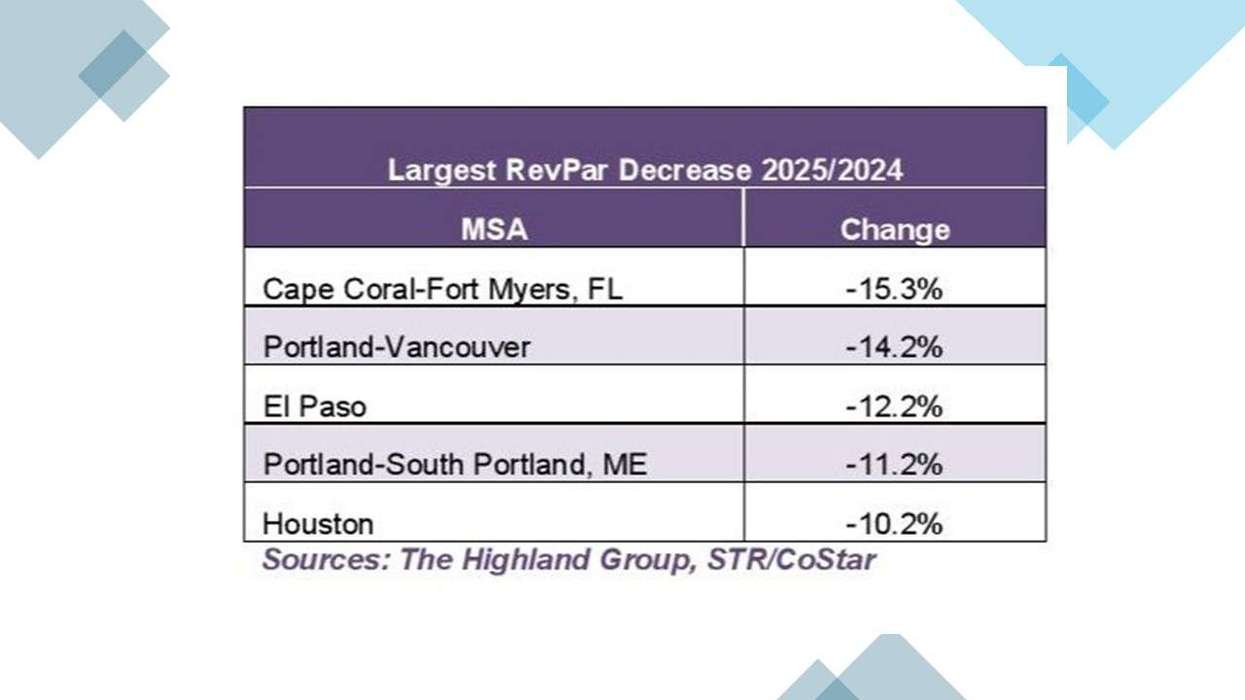THE MASSIVE MOTORCYCLE rally in Sturgis, South Dakota, gave that state the highest hotel occupancy of the week ending Aug. 8 at 71.6 percent, according to STR’s data for the week. There may be a price to pay in safety, however, but overall Western states fared well that week.
Occupancy for the U.S. overall ended at 49.9 percent, a 32.6 percent decline from last year but up from 48.9 percent the week before. ADR was $100.88, down 24.9 percent from last year, while RevPAR dropped 49.4 percent ending at $50.37.
It was the 16th week out of the last 17 in which occupancy rose, part of an international trend, said Jan Freitag, STR’s senior vice president of lodging insights, in a video deep dive of the data for the week.
“The global occupancies continue to increase at a good pace,” Freitag said. “The U.S. barely missed being half full last week as occupancy came in at 49.9 percent.”
The state of the pandemic improved some, Freitag said.
“The number of new COVID-19 cases in the U.S. continues to slow, last week at 360,000 new cases and you see that the RevPAR last week stood for the first time in a long time at better than minus 50 percent,” he said. “Just barely, but this is a trend we’ll probably continue to see all the way through August.”
A little more than 18 million room nights were sold but week-over-week demand percent change has slowed to an average of 1.9 percent.
“The number of people traveling by air has also increased, but the ratio of the number of people flying versus total number of rooms sold has really not changed very much, it’s roughly around 30 percent,” Freitag said.
In previous videos, Freitag had shown charts demonstrating that the number of room nights sold has slowed over the past few weeks. This time he showed the same pattern in the TSA data.
“Clearly, from the week of April 18, which was the lowest air passenger count, you see a sharp acceleration in growth all the way through the middle of July,” Freitag said. “But, after that, the average growth per week is only 0.2 percent.”
Weekend occupancies continue to be healthy, with occupancy on the weekend of Aug. 7 to 8 standing at 57.7 percent.
Western states did better in terms of occupancy, though also New Jersey finished in the top five states.
“The New Jersey shore had actually occupancy of more than 75 percent last week, but overall far west the occupancies are much, much higher.”
South Dakota was one of those states as 250,000 people are expected to descend on the small village of Sturgis for the rally, Freitag said.
“You already see in the first two days of the 10-day event the occupancies and RevPARs were lifted. We saw for the week that RevPAR was up 17 percent and ADR was up over 10 percent,” he said. “What’s a little concerning from seeing photos of the event is that most people are not wearing masks. That, of course, could mean that people may get COVID-19 and then take it back to the states where they’re from because, of course, most of them don’t live in South Dakota.”
In terms of individual markets, STR’s top 25 together saw 41.7 percent occupancy for the week and ADR stood at $98.90. Norfolk and Virginia Beach, Virginia, was the only one of those major markets to reach a 60 percent occupancy level with 66.9 percent. Three additional markets reached or surpassed 50 percent occupancy: Philadelphia with 58.5 percent; Detroit with 52.5 percent and San Diego with 51.1 percent.
Lowest occupancies were found in Oahu Island, Hawaii, at 20.2 percent and Orlando, Florida, at 29.6 percent.
Freitag also noted the Las Vegas convention data remained flat at zero.
“This is the third month in a row that the convention attendance stood at zero,” he said.
Freitag said he was asked if that was not the case nationwide, but he said group occupancy nationwide stands at 5 percent.
“So, yes there are very, very small groups in some areas but certainly not in Las Vegas,” he said.
The U.S. hotel construction pipeline is beginning to slow, Freitag said.
“As we had expected and will continue to expect, the number of rooms in construction is decelerating from the peak in April of 220,000 rooms,” he said. “It is still now 1 percent higher than it was a year ago and I would fully expect that within the next three months that ratio will go negative and we’ll actually see a decline year over year.”
There were no big shifts in the school break calendar from last year.
“The shifts that we see in the school break calendar are all calendar based,” Freitag said. “There is not a COVID-19 induced large number of closures.”
Last week STR and Tourism Economics released a modified forecast during the opening of the 2020 Hotel Data Conference online. The forecast calls for U.S. hotel demand and room revenue to recover from the current downturn by 2023 and 2024 respectively.





